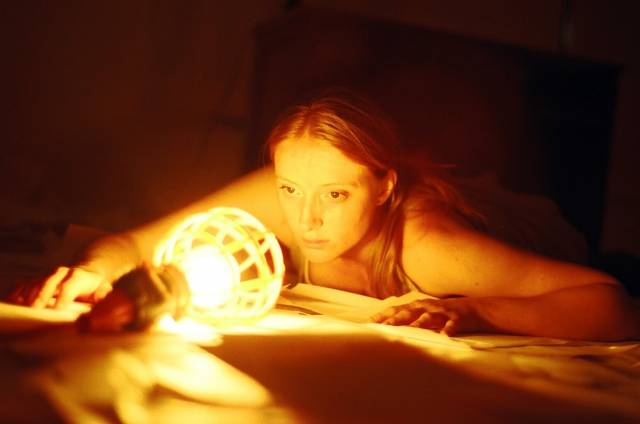

Identity, self vs. state, radicalism, liberalism: there are just some of the themes at play in True Believer, a solo play developed at Theaterlab written by Asa Merritt and performed by Kersti Bryan. These themes collide in ways that are in equal parts confounding and captivating, taking us on a journey from the insular corners of a writer’s study to the harrowing streets of Cairo, from rooms in a house full of wide-eyed revolutionaries to the Capitol Building surrounded by tourists in Washington, D.C.
Joshua Kahan Brody’s deft direction enables each place to remain specific yet somehow be part of a larger world that is both dangerous and alluring. There are some wonderful moments of stagecraft -- paper airplanes acting as stand-ins for bombs and crumbled rejection letters, a hanging light that creates light and shadow around the heroine’s face as she contemplates the meaning of her existence, and a broom that attempts to sweep truths away but only gathers them in an inevitable mountain of futile resistance. Playing against these stark images are wonderful compositions by musician Bay Bryan, who moved me from scene to scene, literally and figuratively, in a play that was very much spiraling out of control.
It was gratifying to see Kersti Bryan, who plays a lost journalist, let herself go wherever the text took her. Whether sharing stories with the audience as she passed out Budweiser beers or hiding in the corner, she committed fully to every moment, savoring in the character’s inconsistencies. In fact, she was at her best when the play was at its most complex, but she carried even clichés with a sense of enjoyment, making them momentarily work.
Unfortunately, even a sturdy creative team could not save the flaws in the writing. The play took on entirely too much for the running time (60 minutes) and moved so fast, it ended up exploring only the surface of every story it touched. While Bryan gave a strong performance, hearing only her voice became monotonous and I began to feel trapped not inside a room, but inside the main character’s head. True Believer is mostly a monologue, and I can’t help but wonder if the playwright sacrificed juicy dialogue for lofty, adjective-laden descriptions. Not only did this render the work static, it also didn’t allow me to fully experience the complexities the play claimed to grapple with. Since I couldn’t hear the multitude of voices in the world, I had only one perspective to ponder.
And for all the places that I traveled with our heroine writer, that feels like a missed opportunity.